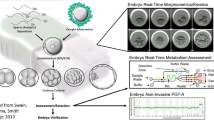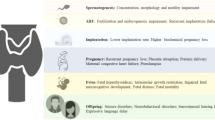Abstract
Purpose
To examine the effect of co-incubating spermatozoa with human follicular fluid (HFF) on the rate of sperm DNA fragmentation.
Methods
This prospective study used semen (n = 23) and HFF from oocyte donors (n = 23). Liquified semen was divided into four aliquots: (1) neat semen (NEAT), (2) seminal plasma removed and replaced with sperm media (HTF) containing 0% (FF0), (3) 20% (FF20), or (4) 50% (FF50) HFF. Sperm motility and DNA fragmentation (SDF) were assessed following 24 h of incubation at 37 °C. Pro-oxidant capacity of HFF and seminal plasma and the effect of HFF on seminal plasma DNase activity was assessed in a sub-sample of 10 ejaculates.
Results
Sperm motility was higher after 3 h of incubation in media that contained HFF compared to the NEAT sample or when sperm was diluted in media without HFF. r-SDF (increase of SDF per time unit) values after 24 h of incubation for NEAT, FF0, FF20 and FF50 were 0.91, 0.69, 0.25 and 0.36, respectively. While pro-oxidant capacity of seminal plasma samples showed large variation (mean: 94.6 colour units; SD 65.4), it was lower and more homogeneous in FF samples (mean: 29.9 colour units; SD: 6.3). Addition of HFF to seminal plasma appeared to inhibit DNase activity.
Conclusion
While differences exist in the pro-oxidant capacity of seminal plasma of patients, sperm DNA integrity was preserved with addition of HFF to sperm media, irrespective of the level of pro-oxidant capacity. DNase activity in the original seminal plasma was abolished after HFF co-incubation.




Similar content being viewed by others
References
Fawcett DW. A textbook of histology. London: Taylor and Francis; 1998.
Shen X, Liu X, Zhu P, Zhang Y, Wang J, Wang Y, et al. Proteomic analysis ofhuman follicular fluid associated with successful in vitro fertilization. Reprod Biol Endocrinol. 2017;15:58. https://doi.org/10.1186/s12958-017-0277-y.
Ambekar AS, Nirujogi RS, Srikanth SM, Chavan S, Kelkar DS, Hinduja I, et al. Proteomic analysis of human follicular fluid: A new perspective towards understanding folliculogenesis. J Proteome. 2013;87:68–77. https://doi.org/10.1016/j.jprot.2013.05.017.
Getpook C, Wirotkarun S. Sperm motility stimulation and preservation with various concentrations of follicular fluid. J Assist Reprod Genet. 2007;24:425–8.
Mendoza C, Tesarik J. Effect of follicular fluid on sperm movement characteristics. Fertil Steril. 1990;54:1135–9.
Ralt D, Goldenberg M, Fetterolf P, Thompson D, Dor J, Mashiach S, et al. Sperm attraction to a follicular factor(s) correlates with human egg fertilizability. Proc Natl Acad Sci U S A. 1991;88:2840–4.
Villanueva-Diaz C, Arias-Martinez J, Bermejo-Martinez L, Vadillo-Ortega F. 1 progesterone induces human sperm chemotaxis. Fertil Steril. 1995;64:1183–8.
Jeon BG, Moon JS, Kim KC, Lee HJ, Choe SY, Rho GJ. Follicular fluid enhances sperm attraction and its motility in human. J Assist Reprod Genet. 2001;18:407–12.
Bahmanpour S, Namavar MR, Talaei-Khozani T, Mazaheri Z. The effect of follicular fluid on sperm chromatin quality in comparison with conventional media. Eur Rev Med Pharmacol Sci. 2012;16:1840–6.
Seli E, Gardner DK, Schoolcraft WB, Moffatt O, Sakkas D. Extent of nuclear DNA damage in ejaculated spermatozoa impacts on blastocyst development after in vitro fertilization. Fertil Steril. 2004;82:378–83.
Bungum M, Humaidan P, Axmon A, Spanò M, Bungum L, Erenpreiss J, et al. Sperm DNA integrity assessment in prediction of assisted reproduction technology outcome. Hum Reprod. 2007;22:174–9.
Gosálvez J, López-Fernández C, Fernández JL, Esteves SC, Johnston SD. Unpacking the mysteries of sperm DNA fragmentation. J Reprod Biotech Fertil. 4:205891581559445. https://doi.org/10.1177/2058915815594454.
Gosálvez J, López-Fernández C, Fernández JL, Gouraud A, Holt WV. Relationships between the dynamics of iatrogenic DNA damage and genomic design in mammalian spermatozoa from eleven species. Mol Reprod Dev. 2011;78:951–61.
Sliwa L. Hyaluronic acid and chemoattractant substance from follicular fluid: in vitro effect of human sperm migration. Arch Androl. 1999;43:73–6.
Wdowiak A, Bakalczuk S, Bakalczuk G. Decreased activity of superoxide dismutase in the seminal plasma of infertile men correlates with increased sperm deoxyribonucleic acid fragmentation during the first hours after sperm donation. Androl. 2015;3:748–55.
Saleh RA, Agarwal A, Nada EA, El-Tonsy MH, Sharma RK, Meyer A, et al. Negative effects of increased sperm DNA damage in relation to seminal oxidative stress in men with idiopathic and male factor infertility. Fertil Steril. 2003;79:1597–605.
Wright C, Milne S, Leeson H. Sperm DNA damage caused by oxidative stress: modifiable clinical, lifestyle and nutritional factors in male infertility. Reprod BioMed Online. 2014;28:684–703.
Villani P, Eleuteri P, Grollino MG, Rescia M, Altavista P, Spanò M, et al. Sperm DNA fragmentation induced by DNAse I and hydrogen peroxide: an in vitro comparative study among different mammalian species. Reproduction. 2010;140:445–52.
Gosálvez J, González-Martínez M, López-Fernández C, Fernández JL, Sánchez-Martin P. Shorter abstinence decreases sperm deoxyribonucleic acid fragmentation in ejaculate. Fertil Steril. 2011;96:1083–6.
Hebles M, Dorado M, Gallardo M, González-Martínez M, Sánchez-Martin P. Seminal quality in the first fraction of ejaculate. Syst Biol Reprod Med. 2015;61:113–6.
Ortiz I, Dorado J, Morrell J, Gosálvez J, Crespo F, Jimenez JM, et al. New approach to assess sperm DNA fragmentation dynamics: fine-tuning mathematical models. J Anim Sci Biotechnol. 2017;8:23. https://doi.org/10.1186/s40104-017-0155-7.
Morrell JM, Rodriguez-Martinez H. Biomimetic techniques for improving sperm quality in animal breeding: a review. Open Androl J. 2009;1:1–9.
Pan C, Wu Y, Yang Q, Ye J. Effects of seminal plasma concentration on sperm motility and plasma and acrosome membrane integrity in chilled canine spermatozoa. Pol J Vet Sci. 2018;21:133–8.
Tvrdá E, Arroyo F, Gosálvez J. Dynamic assessment of human sperm DNA damage I: the effect of seminal plasma-sperm co-incubation after ejaculation. Int Urol Nephrol. 2018;50:1381–8.
Gosálvez J, Cortés-Gutiérrez EI, Nuñez R, Fernández JL, Caballero P, López-Fernández C, et al. A dynamic assessment of sperm DNA fragmentation versus sperm viability in proven fertile human donors. Fertil Steril. 2009;92:1915–9.
Matsuura R, Takeuchi T, Yoshida A. Preparation and incubation conditions affect the DNA integrity of ejaculated human spermatozoa. Asian J Androl. 2010;12:753–9.
Nabi A, Khalili MA, Halvaei I, Roodbari F. Prolonged incubation of processed human spermatozoa will increase DNA fragmentation. Andrologia. 2014;46:374–9.
Gosálvez J, López-Fernández C, Hermoso A, Fernández JL, Kjelland ME. Sperm DNA fragmentation in Zebrafish (Danio rerio) and its impact on fertility and embryo viability - implications for fisheries and aquaculture. Aquaculture. 2014;433:173–82.
Johnston SD, López-Fernández C, Arroyo F, Gosálbez A, Cortés Gutiérrez E, Fernández JL, et al. Reduced sperm DNA longevity is associated with an increased incidence of still born; evidence from a multi-ovulating sequential artificial insemination animal model. J Assist Reprod Genet. 2016;33:1231–8.
Aitken RJ, De Iuliis GN, Mclachlan RI. Biological and clinical significance of DNA damage in the male germ line. Int J Androl. 2009;32:46–56.
Tan J, Taskin O, Albert A, Bedaiwy MA. Association between sperm DNA fragmentation and idiopathic recurrent pregnancy loss: a systematic review and meta-analysis. Reprod BioMed Online. 2019;38:951–60.
Dalzell LH, McVicar CM, McClure N, Lutton D, Lewis SE. Effects of short and long incubations on DNA fragmentation of testicular sperm. Fertil Steril. 2004;82:1443–5.
Agarwal A, Gupta S, Sharma RK. Role of oxidative stress in female reproduction. Reprod Biol Endocrinol. 2005;3:28.
Gupta S, Ghulmiyyah J, Sharma R, Halabi J, Agarwal A. Power of proteomics in linking oxidative stress and female infertility. Biomed Res Int. 2014;2014:916212. https://doi.org/10.1155/2014/916212.
Luddi A, Capaldo A, Focarelli R, Gori M, Morgante G, Piomboni P, et al. Antioxidants reduce oxidative stress in follicular fluid of aged women undergoing IVF. Reprod Biol Endocrinol. 2016;14:57. https://doi.org/10.1186/s12958-016-0184-7.
Author information
Authors and Affiliations
Corresponding author
Additional information
Publisher’s note
Springer Nature remains neutral with regard to jurisdictional claims in published maps and institutional affiliations.
Rights and permissions
About this article
Cite this article
Dorado-Silva, M., Bartolomé-Nebreda, J., Sánchez-Martín, P. et al. Co-incubation of spermatozoa with human follicular fluid reduces sperm DNA fragmentation by mitigating DNase activity in the seminal plasma. J Assist Reprod Genet 37, 63–69 (2020). https://doi.org/10.1007/s10815-019-01643-2
Received:
Accepted:
Published:
Issue Date:
DOI: https://doi.org/10.1007/s10815-019-01643-2




